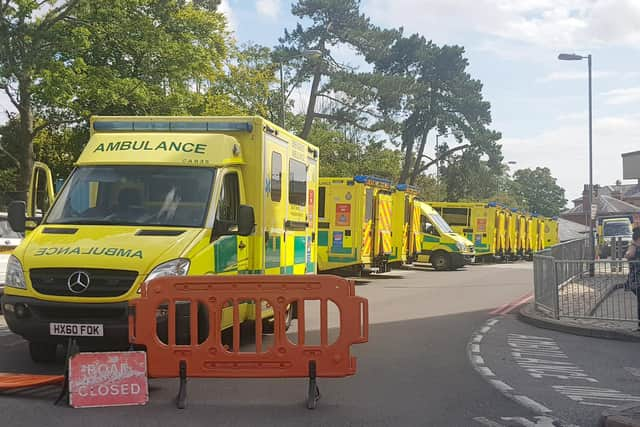South Central Ambulance Service declares 'critical incident' as it says it is overwhelmed by calls
and live on Freeview channel 276
South Central Ambulance Service issued a plea on Saturday night to people to only call 999 in the event of ‘life-threatening illnesses and injuries’ as it says it is struggling to respond to all calls.
A statement said: ‘South Central Ambulance Service has declared a critical incident due to extreme pressures across our services.
Advertisement
Hide AdAdvertisement
Hide Ad‘Our staff and volunteers are working extremely hard to respond to calls but the volume is overwhelming.
‘Please, please, support us by using our services wisely, we’re here for life threatening illnesses and injuries. Thank you so much.’
City council leader Gerald Vernon-Jackson said: 'I think it's extremely worrying, and when I talk to people at QA they're very worried about the winter - rising Covid cases and flu cases.
‘Walk-in is under huge pressure as well. The other day there was a five hour wait. There's enormous pressure.
Advertisement
Hide AdAdvertisement
Hide Ad‘The thing everybody can do is make sure that they and their family all have their Covid vaccination and their booster, and their flu vaccinations as well. That reduces the risk of people getting seriously ill and needing to be taken into hospital.’


Portsmouth North MP Penny Mordaunt said: ‘The QA and the ambulance service are having to deal with a perfect storm. Pressures on other parts of healthcare, including the lack of provision in dentistry, are causing more people to turn to the hospital for help.
‘I’m worried that as we go into winter with many new parents not having had their child experience normal coughs and colds these pressures on the QA and on GPs will grow. It is vital we use each part of the health service for what it was intended. I’m going to be working with healthcare professionals to ensure that message gets out this winter.’
As reported, at one point on Wednesday, October 20, 30 ambulances were seen queuing outside Queen Alexandra Hospital, waiting to discharge patients.
Advertisement
Hide AdAdvertisement
Hide AdThe hospital’s deputy medical director Dr Mark Roland said then: ‘We're having a really difficult time here at the hospital. Currently we have increasing numbers of Covid cases in our beds and in our ITU.
‘We’ve started to see the first of our flu cases for this winter and we have a huge number of people attending hospital for other reasons not related to infections.
‘Our pressure on our services, on our emergency department, on our wards, is equivalent to what we would see at the very worst of the winter time.
‘We need our population to work with us, to help us and the other emergency services, including the ambulance service.’
Advertisement
Hide AdAdvertisement
Hide AdOn Friday the hospital wrote on Facebook: ‘Our emergency department continues to be incredibly busy and we need your help.’
When ambulances have to queue at QA, it means they cannot be sent out to other call-outs, leading to longer waits for patients.
A Facebook post published early on Saturday on a Sarisbury Green residents page said that at 4am there were 21 ambulances waiting outside QA with patients on board, with what was claimed to be a minimum nine-hour wait in accident and emergency,
Last night NHS England's national medical director, Professor Stephen Powis, said the coming months are likely to be ‘extremely tough’, amid pressures from a combination of Covid-19 and seasonal flu.
Advertisement
Hide AdAdvertisement
Hide AdHe urged people to go online if they need care for something urgent but not life-threatening, instead of rushing to busy A&E departments as the health service faces a ‘winter like no other’.
Last week, ambulance leaders described the ‘highest level of emergency activity in history’ and reports from around the country paint a bleak picture of ambulances queuing for hours outside busy hospitals.
Martin Flaherty, managing director of the Association of Ambulance Chief Executives, said: ‘The ambulance sector is experiencing some of the highest levels of emergency activity in its history and this is regrettably leading to delays in the sector’s ability to respond to some patients.’
One ambulance trust defines a critical incident as ‘any localised incident where the level of disruption results in the organisation temporarily or permanently losing its ability to deliver critical services, patients may have been harmed or the environment is not safe requiring special measures and support from other agencies, to restore normal operating functions.’